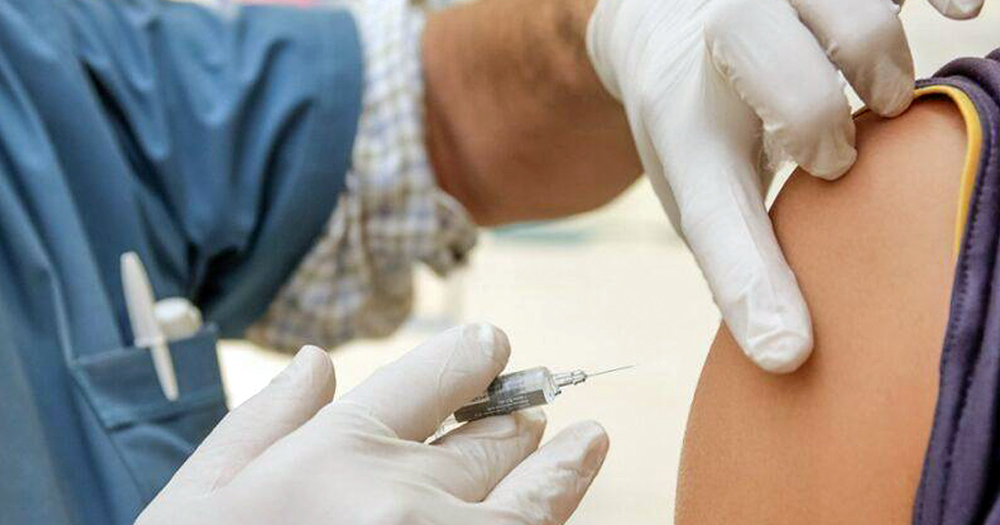by Laura Knabel, RN & IBCLC Vaccine Coordinator, Dubuque Visiting Nurse Assoc.
For the past 200+ years vaccines have helped prevent illness and save lives. In fact, the first vaccine was invented in 1796 by Edward Jenner, a country doctor in England, to prevent Smallpox. In 1959 the World Health Organization (WHO) started a plan to rid the world of smallpox, and efforts were intensified in 1967. Almost two centuries after Jenner hoped that vaccination could annihilate smallpox, the 33rd World Health Assembly declared the world free of this disease on May 8, 1980. Many people consider smallpox eradication to be the biggest achievement in international public health.
The CDC defines a vaccine as “a product that stimulates a person’s immune system to produce immunity to a specific disease, protecting the person from that disease.” Vaccines use very small amounts of antigens to teach your child’s immune system to recognize and learn to fight serious illnesses. If you are immune to a disease you can be exposed to it without becoming infected or becoming severely ill.
Childhood and Adolescent Vaccines are no different. These vaccines help our infants, children, and adolescents live healthy lives free from the worry of contracting a potentially life-altering illness. Diseases that used to be common in this country and around the world, including polio, measles, diphtheria, pertussis (whooping cough), rubella (German measles), mumps, tetanus, rotavirus, varicella, and Haemophilus influenzae type b (Hib) can now be prevented by vaccination. If an unvaccinated child is exposed to a disease germ, the child’s body may not be strong enough to fight the disease. Those same germs exist today, but we don’t see these diseases nearly as often because babies, children, and adults are protected by vaccines.
So why keep vaccinating if most of these illnesses are gone? The Centers for Disease Control and Prevention (CDC) likens this to bailing out a leaking boat.
“When we started bailing, the boat was filled with water. But we have been bailing fast and hard, and now it is almost dry. We could say, ‘Good. The boat is dry now, so we can throw away the bucket and relax.’ But the leak hasn’t stopped. Before long we’d notice a little water seeping in, and soon it might be back up to the same level as when we started.”
If we stopped vaccinating altogether, diseases that are almost unknown would surely be back.
As a parent, you want to keep your children safe. Routine childhood vaccinations are an important way to ensure that your child and community remain healthy and protected against serious diseases. Babies and children are exposed to thousands of germs every day in their environment, and are protected by antibodies they get from their mothers in utero and while breastfeeding. However, this immunity diminishes in the first year of life.
Before vaccines, many children died from diseases we are preventing today. Immunizing children and young adults also protects the rest of our community, especially those that cannot be vaccinated if they are too young or cannot due to certain medical conditions.
With the increased availability of media, both social and news outlets, the safety of vaccines has become a very hot topic this past year. Child vaccination coverage remains high nationally, and most parents are confident in the safety and effectiveness of vaccines. However, the spread of myths and misinformation has put some communities at risk. When misleading information circulates, vaccination coverage can fall and increase the risk for outbreaks of vaccine-preventable diseases.
Making sure vaccines are safe has been a priority of the CDC and The Food and Drug Administration (FDA). They take many steps to ensure safety before and after the public begins using the vaccine. Once a vaccine is licensed and approved the FDA, CDC, and National Institutes of Health (NIH) routinely monitor the use and potential safety concerns. Mild side effects to vaccines are expected and can include fatigue, low-grade fever, or pain and redness at the injection site. These reactions normally go away within a few days.
Families have been doing their part and were staying at home as much as possible to help stop the spread of COVID-19 during the pandemic. An unfortunate result of this was that many children missed check-ups and recommended childhood vaccinations. The CDC and the American Academy of Pediatrics (AAP) recommended every child continued to receive recommended vaccinations during the COVID-19 pandemic. As schools, day cares, and camps begin to reopen and offer in-person learning and care, it’s particularly important for parents to work with their child’s health care provider to make sure they get caught up on well child visits and vaccines.
Vaccines work to prevent disease that can be dangerous, costly to treat, and even deadly. Statistically, the chances of your child getting diseases like Rubella, pertussis or Hepatitis A might be low and your child might never need the protection vaccines offer. However, you don’t want them to be lacking the protection vaccines provide if they ever do need it.
If someone you know is in need of vaccinations but is unable to locate a provider, please call the Dubuque Visiting Nurse Association at (563) 556-6200 to see if they are eligible to receive them through our office.





Comment here